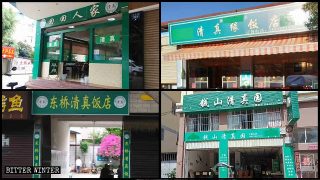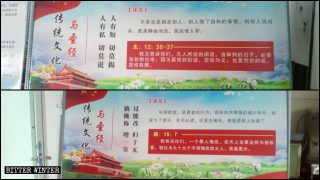Shops and restaurants run by Hui people across China are losing an integral part of Muslim cultural identity, as the CCP pushes forward its “sinicization” policy.
by Wang Anyang
In October 2019, over ten officers from the United Front Work Department and the Ethnic and Religious Affairs Bureau burst into a Hui-run restaurant in Chaoyang, a prefecture-level city in the northeastern province of Liaoning. They ordered the owner to remove all words in Arabic from the signboard and the menu. He ended up spending more than 1,000 RMB (about $ 140) to implement the order, but with the changes, the business started slowing down.
Most halal restaurants in China have signboards with various phrases in Arabic, the most popular being “In the name of God, the Most Gracious, the Most Merciful.” They also indicate, with a sign or in words, that the place is halal, i.e., adheres to Islamic law, as defined in the Quran.
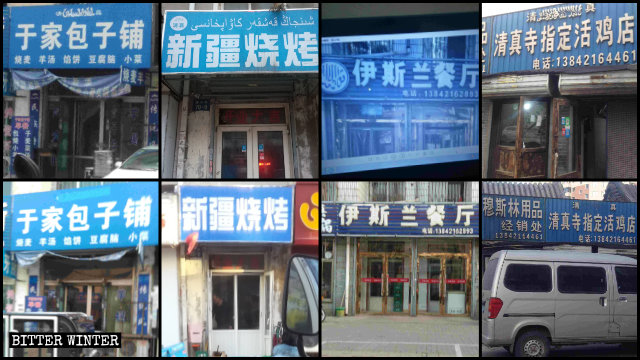
Reportedly, the Arabic script was eliminated from at least 200 Hui restaurants across Liaoning in November 2019. According to a document issued by the Ethnic and Religious Affairs Bureau in Liaoning’s Shenyang city, all Islam-related symbols and items, including the star and crescent, prayer rugs, and alike, should be removed from public places like hotels.
Earlier this year, in response to the feedback from a central government inspection team, a municipal government in Jilin Province issued an order to strengthen the “sinicization” of mosques, continuously investigate and rectify restaurants, hotels, and shops that bear Arabic-style or religious content, and also remove Islamic symbols in public places. The rectification work is required to be completed by June 30, 2020. According to some reports, from September to December last year, about 1,000 businesses in Jilin Province were ordered to remove words and phrases in Arabic from their signboards.
Authorities in Inner Mongolia have also expressly ordered to remove everything in Arabic: More than 250 shops were affected by the policy in the prefecture-level city of Chifeng last October and November alone; so were at least 200 shops in Hulunbuir city’s Hailar district.
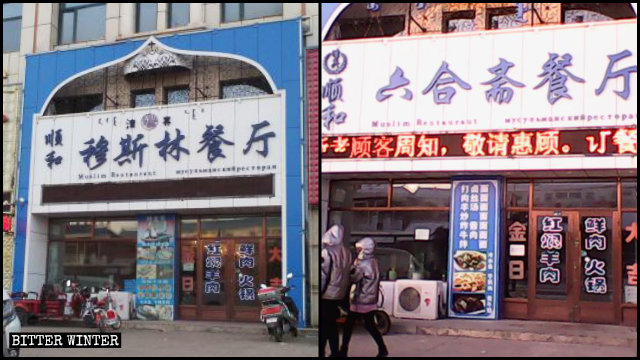
A large Hui restaurant in Chifeng’s Hongshan district was ordered to replace a phrase in Arabic on a wall inside it with a mural, and remove tableware with Arabic symbols. The changes have cost the owner about 90,000 RMB (about $ 12,000).
“Officials came for inspections time and again; they even checked the bottoms of teapots,” another local restauranteur complained. “If you are not obedient, they will convict you for any crime they want and put you in prison as a terrorist.”
“The government ordered to eradicate words and phrases in Arabic, allowing only written Chinese,” a halal store owner said helplessly. “Hui people are more eager to enter places with signboards in Arabic. If Muslims from foreign countries come, they know what the place is, as they cannot read Chinese.”
Businesses in the eastern province of Shandong have been similarly affected. In November, at least 200 Hui shops in Dezhou, a prefecture-level city in Shandong, had phrases in Arabic painted over on signboards, following local government orders that all non-Chinese characters must be removed, including Mongolian, Tibetan, and other languages of ethnic minorities.
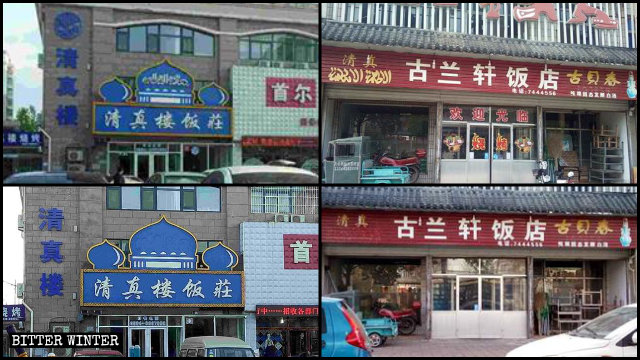
“The CCP just wants to ‘sinicize’ Hui people, so that they can be easily managed like Han Chinese,” commented a Hui shop owner. “It claims that all 56 ethnic groups in China are a family, but we are never treated as equal family members.”
Source: Bitter Winter


